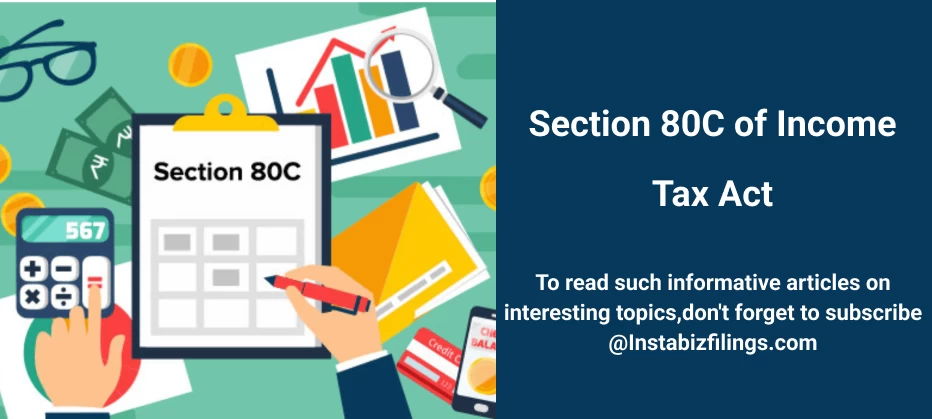
Section 80C of Income Tax Act
July 23, 2025 by Team Instabizfilings
Introduction
Section 80C is the most popular(used by the Indian taxpayers) as well as the most practical part of the Income Tax Act 1961.It gives deduction to certain investments and expenses that cross a specified limit which lessens tax earning of an individual or Hindu Undivided Family (HUF).
This section promotes savings and investments in some financial instruments that could also be used as long-term financial objectives, such as retirement plans, child education, money to own a home, and so on.
Maximum Deduction Limit under Section 80C
-
The highest that should be claimed as per the section 80C is 1,50,000/ - within one financial year.
-
The deduction is only accessible to an individual and HUF.
-
This deduction cannot be accessed by Companies, LLPs and Firms.
Who Can Claim 80C?
-
Resident Individuals
-
Non Resident Indians (NRI)
-
The Hindu Undivided Family (HUF)
Eligible Investments & Payments under Section 80C
The following list is of the most popular and accepted investments and expenditures that qualify under Section 80C:
- Life Insurance Premium
- Paid a high amount of money to acquire a life insurance cover on oneself, spouse or children.
- The policy can be that of any insurer that has been approved by IRDAI.
- Premium can be below 10 percent of the sum assured on policies taken on after April 1, 2012.
- The contributions of a worker towards the EPF account.
- Automatically deducted salary.
- Public Provident Fund (PPF)
- PPF contributions (min 500 and max 1.5 lakh paid yearly).
- Has a 15-year lock-in.
- National Savings Certificate (NSC)
- The interest charged in this provision is allowed as a deduction under 80C of the Income Tax Act.
- It has a maturity of 5 years and is issued in the post offices.
- 5-Year Fixed Deposit (Tax Saving FD)
- Scheduled banking fixed deposits with a lock-in of 5 years.
- Income on interest is taxed.
- Equity-Linked Savings Scheme (ELSS)
- 3-year lock-in mutual funds which save tax.
- It has the possibility of great returns; however, it has the risk of the market.
- Principal Repayment on Home Loan
- In the main part, we only have one EMI.
- One should not sell houses within a period of 5 years of ownership.
- Sukanya Samriddhi Yojana (SSY)
- The girl child is 10 years old.
- The deduction can be claimed by the parents or the legal guardians.
- Tuition Fees
- Finance full-time education (in case of up to 2 children), tuition as well.
- Weighted to any school, college, university or any other institution of learning in India.
- Senior Citizen Savings Scheme (SCSS)
- In people above 60 years old.
- It requires a minimum investment of 1,000 rupees, whilst the maximum is 15 lakh rupees.
- Unit Linked Insurance Plans (ULIPs)
- Insurance/ + lock-in 5-year investment products.
- Stamp Duty and Registration Charges
- Paid on getting a new house.
- Entitlement can also be acquired even when the house is still under construction.
Important Points to Note
-
The maximum permissible deduction, as allowed by Sections 80C, 80CCC (Pension Schemes), and 80CCD (1) (NPS), is Rs.
-
It also allows it to claim a deduction of up to 50,000 under 80CCD(1B) for the investments made in the NPS account, along with the 80C deduction.
-
The lock-in period differs for every investment.
-
The taxpayers should be able to retain the documents or evidence of investment/expenditure.
Section 80C vs Other Deductions
|
Section |
Purpose |
Max Limit |
Who can claim? |
|
80C |
Investments & expenses |
₹1,50,000 |
Individuals, HUF |
|
80CCC |
Pension funds |
Included in ₹1.5L |
Individuals |
|
80CCD(1) |
NPS (employee/self) |
Part of ₹1.5L |
Salaried & self-employed |
|
80CCD(1B) |
NPS (additional) |
₹50,000 extra |
Salaried & self-employed |
Conclusion
Section 80C is a basic tax planning and financial development tool. Through intelligent investments and monitoring of qualifying expenses, taxpayers can greatly cut their taxable revenues. But, early tax saving planning during the financial year and diversification according to various financial targets of an individual are very important rather than tax saving.
Disclaimer
The information provided in this blog is purely for general informational purposes only. While every effort has been made to ensure the accuracy, reliability and completeness of the content presented, we make no representations or warranties of any kind, express or implied, for the same.
We expressly disclaim any and all liability for any loss, damage or injury arising from or in connection with the use of or reliance on this information. This includes, but is not limited to, any direct, indirect, incidental, consequential or punitive damage.
Further, we reserve the right to make changes to the content at any time without prior notice. For specific advice tailored to your situation, we request you to get in touch with us.

Need more details? We can help! Talk to our experts now!
Start Your Business Registration – Talk to Our Experts Now!

Still Confused?
Talk to experts? Fill in the information and we will reach out in 24 Working Hours.

